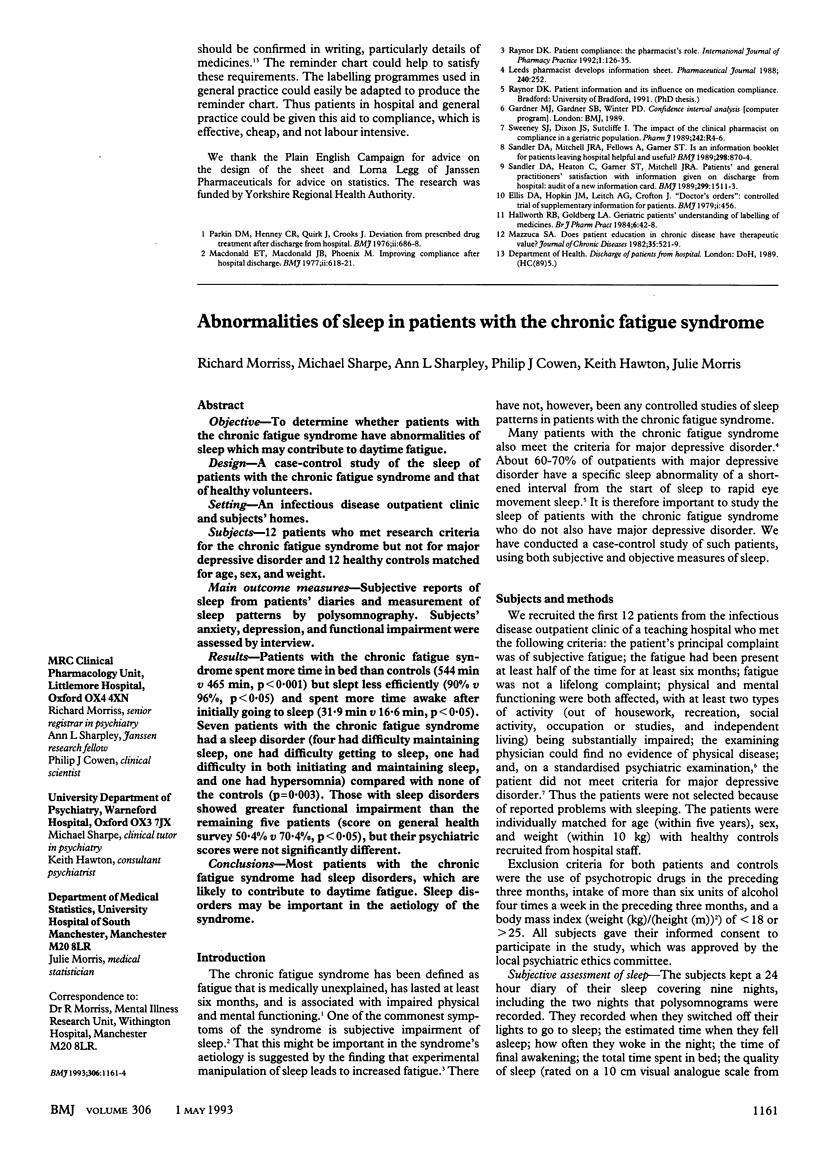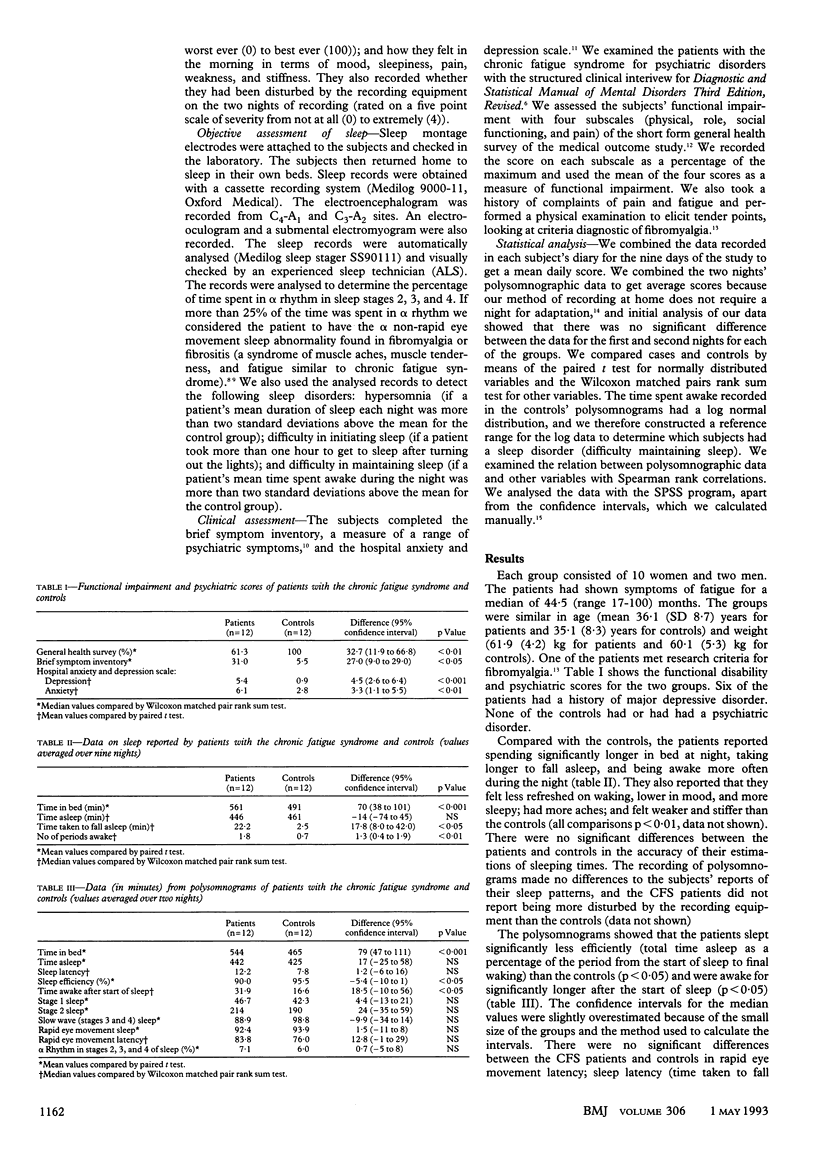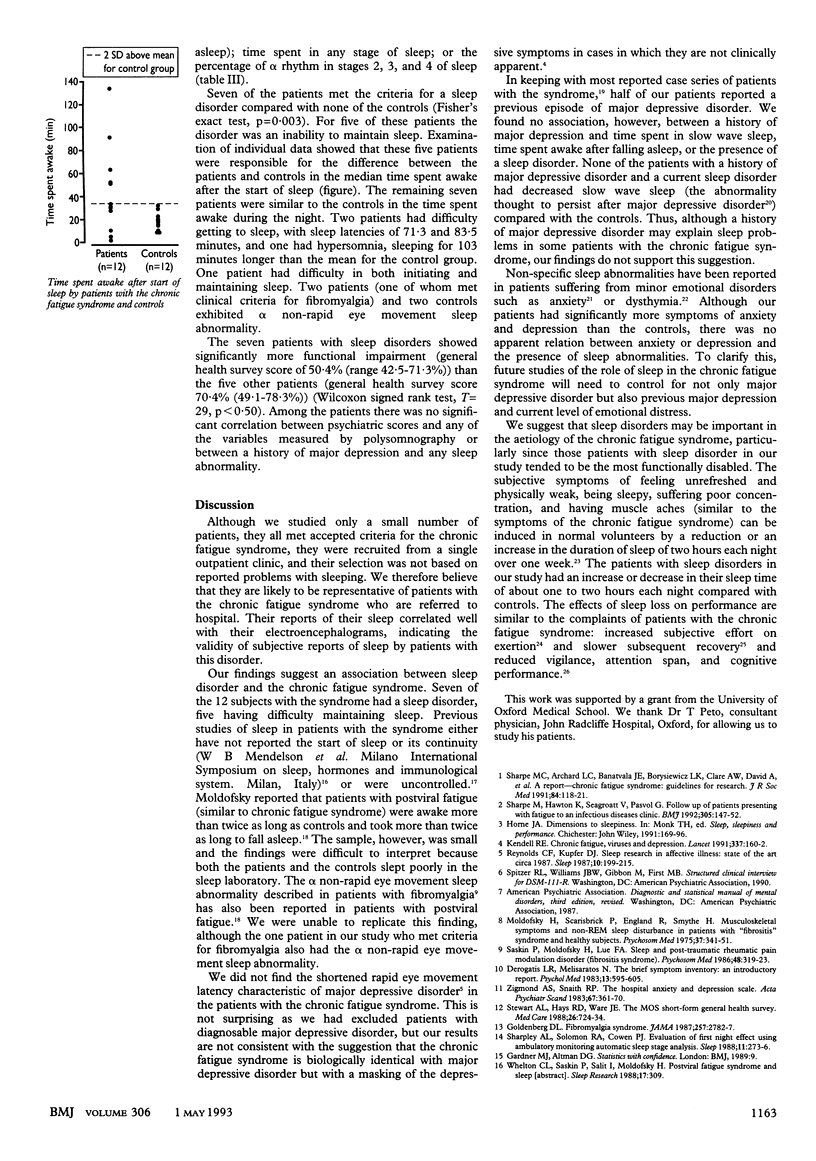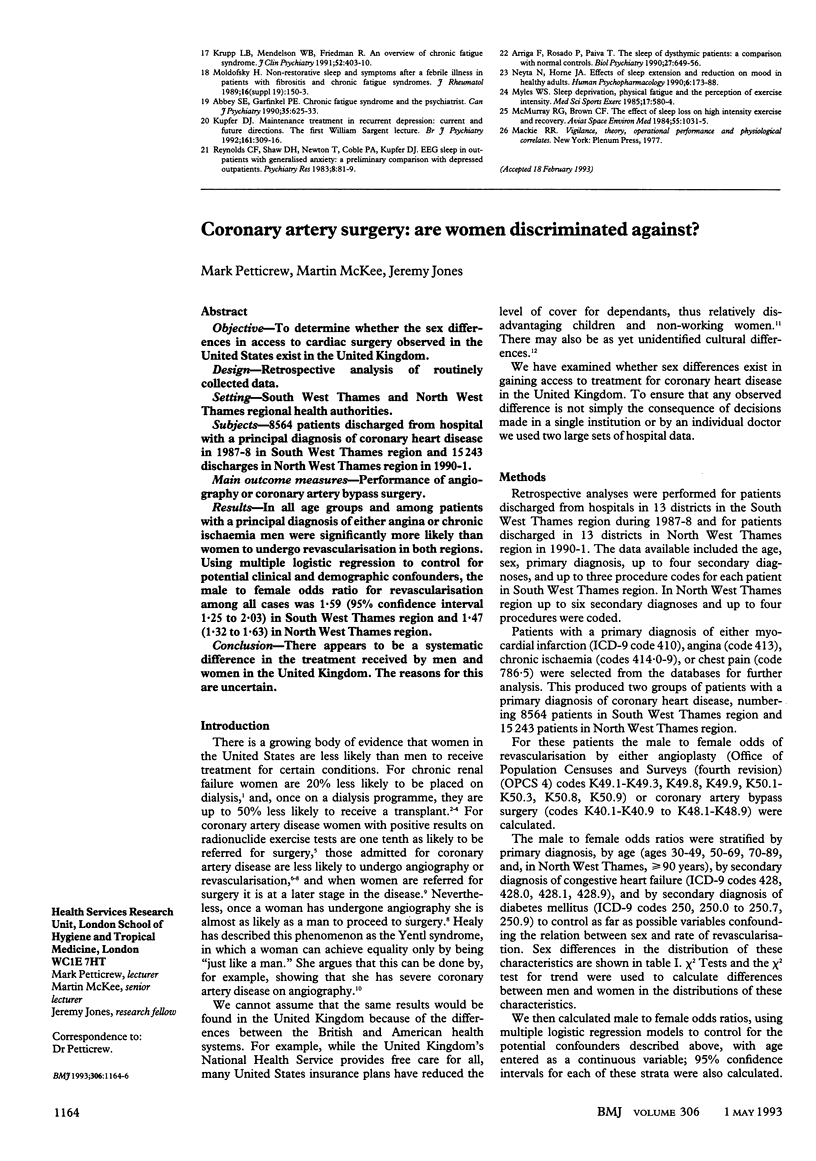Abstract
OBJECTIVE--To determine whether patients with the chronic fatigue syndrome have abnormalities of sleep which may contribute to daytime fatigue. DESIGN--A case-control study of the sleep of patients with the chronic fatigue syndrome and that of healthy volunteers. SETTING--An infectious disease outpatient clinic and subjects' homes. SUBJECTS--12 patients who met research criteria for the chronic fatigue syndrome but not for major depressive disorder and 12 healthy controls matched for age, sex, and weight. MAIN OUTCOME MEASURES--Subjective reports of sleep from patients' diaries and measurement of sleep patterns by polysomnography. Subjects' anxiety, depression, and functional impairment were assessed by interview. RESULTS--Patients with the chronic fatigue syndrome spent more time in bed than controls (544 min v 465 min, p < 0.001) but slept less efficiently (90% v 96%, p < 0.05) and spent more time awake after initially going to sleep (31.9 min v 16.6 min, p < 0.05). Seven patients with the chronic fatigue syndrome had a sleep disorder (four had difficulty maintaining sleep, one had difficulty getting to sleep, one had difficulty in both initiating and maintaining sleep, and one had hypersomnia) compared with none of the controls (p = 0.003). Those with sleep disorders showed greater functional impairment than the remaining five patients (score on general health survey 50.4% v 70.4%, p < 0.05), but their psychiatric scores were not significantly different. CONCLUSIONS--Most patients with the chronic fatigue syndrome had sleep disorders, which are likely to contribute to daytime fatigue. Sleep disorders may be important in the aetiology of the syndrome.
Full text
PDF



Selected References
These references are in PubMed. This may not be the complete list of references from this article.
- Abbey S. E., Garfinkel P. E. Chronic fatigue syndrome and the psychiatrist. Can J Psychiatry. 1990 Oct;35(7):625–633. doi: 10.1177/070674379003500714. [DOI] [PubMed] [Google Scholar]
- Arriaga F., Rosado P., Paiva T. The sleep of dysthymic patients: a comparison with normal controls. Biol Psychiatry. 1990 Mar 15;27(6):649–656. doi: 10.1016/0006-3223(90)90533-8. [DOI] [PubMed] [Google Scholar]
- Derogatis L. R., Melisaratos N. The Brief Symptom Inventory: an introductory report. Psychol Med. 1983 Aug;13(3):595–605. [PubMed] [Google Scholar]
- Goldenberg D. L. Fibromyalgia syndrome. An emerging but controversial condition. JAMA. 1987 May 22;257(20):2782–2787. doi: 10.1001/jama.257.20.2782. [DOI] [PubMed] [Google Scholar]
- Kendell R. E. Chronic fatigue, viruses, and depression. Lancet. 1991 Jan 19;337(8734):160–162. doi: 10.1016/0140-6736(91)90814-6. [DOI] [PubMed] [Google Scholar]
- Krupp L. B., Mendelson W. B., Friedman R. An overview of chronic fatigue syndrome. J Clin Psychiatry. 1991 Oct;52(10):403–410. [PubMed] [Google Scholar]
- Kupfer D. J. Maintenance treatment in recurrent depression: current and future directions. The first William Sargant Lecture. Br J Psychiatry. 1992 Sep;161:309–316. doi: 10.1192/bjp.161.3.309. [DOI] [PubMed] [Google Scholar]
- McMurray R. G., Brown C. F. The effect of sleep loss on high intensity exercise and recovery. Aviat Space Environ Med. 1984 Nov;55(11):1031–1035. [PubMed] [Google Scholar]
- Moldofsky H. Nonrestorative sleep and symptoms after a febrile illness in patients with fibrositis and chronic fatigue syndromes. J Rheumatol Suppl. 1989 Nov;19:150–153. [PubMed] [Google Scholar]
- Moldofsky H., Scarisbrick P., England R., Smythe H. Musculosketal symptoms and non-REM sleep disturbance in patients with "fibrositis syndrome" and healthy subjects. Psychosom Med. 1975 Jul-Aug;37(4):341–351. doi: 10.1097/00006842-197507000-00008. [DOI] [PubMed] [Google Scholar]
- Myles W. S. Sleep deprivation, physical fatigue, and the perception of exercise intensity. Med Sci Sports Exerc. 1985 Oct;17(5):580–584. [PubMed] [Google Scholar]
- Reynolds C. F., 3rd, Kupfer D. J. Sleep research in affective illness: state of the art circa 1987. Sleep. 1987 Jun;10(3):199–215. doi: 10.1093/sleep/10.3.199. [DOI] [PubMed] [Google Scholar]
- Reynolds C. F., 3rd, Shaw D. H., Newton T. F., Coble P. A., Kupfer D. J. EEG sleep in outpatients with generalized anxiety: a preliminary comparison with depressed outpatients. Psychiatry Res. 1983 Feb;8(2):81–89. doi: 10.1016/0165-1781(83)90094-x. [DOI] [PubMed] [Google Scholar]
- Saskin P., Moldofsky H., Lue F. A. Sleep and posttraumatic rheumatic pain modulation disorder (fibrositis syndrome). Psychosom Med. 1986 May-Jun;48(5):319–323. doi: 10.1097/00006842-198605000-00002. [DOI] [PubMed] [Google Scholar]
- Sharpe M., Hawton K., Seagroatt V., Pasvol G. Follow up of patients presenting with fatigue to an infectious diseases clinic. BMJ. 1992 Jul 18;305(6846):147–152. doi: 10.1136/bmj.305.6846.147. [DOI] [PMC free article] [PubMed] [Google Scholar]
- Sharpley A. L., Solomon R. A., Cowen P. J. Evaluation of first night effect using ambulatory monitoring and automatic sleep stage analysis. Sleep. 1988 Jun;11(3):273–276. doi: 10.1093/sleep/11.3.273. [DOI] [PubMed] [Google Scholar]
- Stewart A. L., Hays R. D., Ware J. E., Jr The MOS short-form general health survey. Reliability and validity in a patient population. Med Care. 1988 Jul;26(7):724–735. doi: 10.1097/00005650-198807000-00007. [DOI] [PubMed] [Google Scholar]
- Zigmond A. S., Snaith R. P. The hospital anxiety and depression scale. Acta Psychiatr Scand. 1983 Jun;67(6):361–370. doi: 10.1111/j.1600-0447.1983.tb09716.x. [DOI] [PubMed] [Google Scholar]


